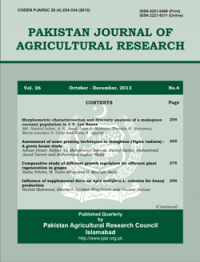Improve the Soil Properties under Two Different Methods (i.e., Tillage Practices and Organic Manuring) of the Wheat Crop
Improve the Soil Properties under Two Different Methods (i.e., Tillage Practices and Organic Manuring) of the Wheat Crop
Manzoor Ali Magsi1*, Naimatullah Laghari1, Ahmed Ali Tagar1, and Habibullah Magsi2
ABSTRACT
The present study was conducted on different tillage on soil depths (i.e., 0-15 cm, 16 to 30 cm, and 31 to 45 cm) and showed significant influence on pH, electrical conductivity of soil (ECe), soil aggregates, organic matter (OM), calcium, magnesium, chloride, carbonate, and bicarbonate. The tillage practices were shallow and deep tillage-assisted with compost, poultry residuals, NPK, and FM (farmyard manure) in the study area for the wheat crop. It was found that the most effective tillage practices were Deep + NPK and Deep + FM in the study area for the crop. The maximum values of micro, macro, and stability aggregates ranged from 10.86 to 21.41, 73.32 to 82.95, and 13.63 to 28.71 g/m3 while treated with different shallow and deep manure in the wheat experiment during cropping years 2019-20 and 2020-21 respectively. Similarly, the OM ranges from 0.60 to 1.48 in the wheat experiment during 2019-20. The present experiment found that the most efficient tillage methods for the wheat crop were shallow tillage + compost and deep tillage + NPK respectively. On the other hand, the highest calcium (Deep + FM), magnesium (Deep + Poultry, Shallow + FM), chloride (Deep + NPK and compost), and carbonate and bicarbonate (Deep + FM and Compost) treatments were found during the cropping year 2019-20 and 2020-21 experiments. Based on experimental results under wheat crop, application of reduced tillage treatment is recommended that would increase the greater marginal rate of return as compared to conventional and no-tillage treatments. Comparable investigations need to be carried out in other ecological zones of Pakistan on different types of soils to introduce appropriate tillage practices that perform better and are site-specific not only for wheat rotation but for other crops. Further experiments should be conducted to analyze the impact of deep tillage treatments on the tillage practices and organic fertilizers on soil properties, growth, and yield of the wheat crop.
To share on other social networks, click on any share button. What are these?







